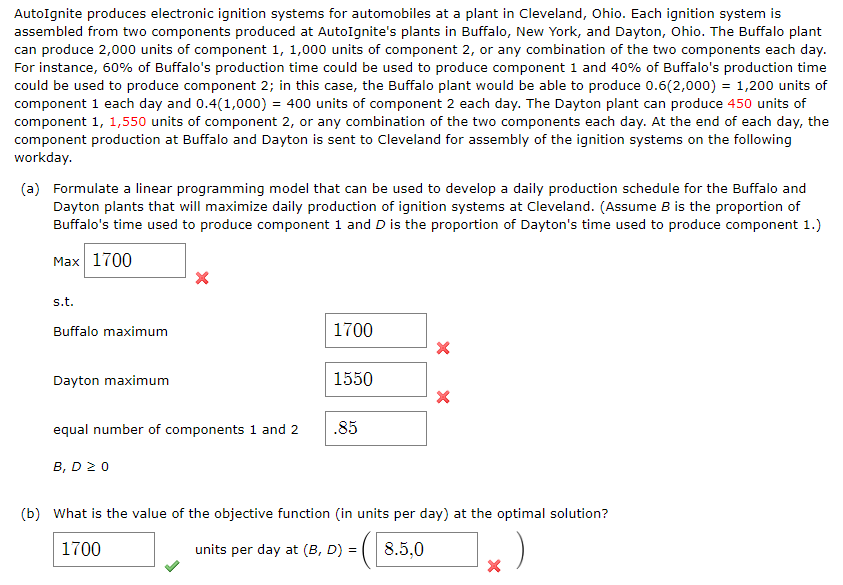Module 2 hw 1 q2
AutoIgnite produces electronic ignition systems for automobiles at a plant in Cleveland, Ohio. Each ignition system is assembled from two components produced at AutoIgnite's plants in Buffalo, New York, and Dayton, Ohio. The Buffalo plant can produce 2,000 units of component 1, 1,000 units of component 2, or any combination of the two components each day. For instance, 60% of Buffalo's production time could be used to produce component 1 and 40% of Buffalo's production time could be used to produce component 2; in this case, the Buffalo plant would be able to produce 0.6(2,000) = 1,200 units of component 1 each day and 0.4(1,000) = 400 units of component 2 each day. The Dayton plant can produce 450 units of component 1, 1,550 units of component 2, or any combination of the two components each day. At the end of each day, the component production at Buffalo and Dayton is sent to Cleveland for assembly of the ignition systems on the following workday. (a) Formulate a linear programming model that can be used to develop a daily production schedule for the Buffalo and Dayton plants that will maximize daily production of ignition systems at Cleveland. (Assume B is the proportion of Buffalo's time used to produce component 1 and D is the proportion of Dayton's time used to produce component 1.) Max 1700 s.t. Buffalo maximum 1700 X Dayton maximum 1550 x equal number of components 1 and 2 .85 BD 20 (b) What is the value of the objective function (in units per day) at the optimal solution? 1700 units per day at (BD) 8.5,0 AutoIgnite produces electronic ignition systems for automobiles at a plant in Cleveland, Ohio. Each ignition system is assembled from two components produced at AutoIgnite's plants in Buffalo, New York, and Dayton, Ohio. The Buffalo plant can produce 2,000 units of component 1, 1,000 units of component 2, or any combination of the two components each day. For instance, 60% of Buffalo's production time could be used to produce component 1 and 40% of Buffalo's production time could be used to produce component 2; in this case, the Buffalo plant would be able to produce 0.6(2,000) = 1,200 units of component 1 each day and 0.4(1,000) = 400 units of component 2 each day. The Dayton plant can produce 450 units of component 1, 1,550 units of component 2, or any combination of the two components each day. At the end of each day, the component production at Buffalo and Dayton is sent to Cleveland for assembly of the ignition systems on the following workday. (a) Formulate a linear programming model that can be used to develop a daily production schedule for the Buffalo and Dayton plants that will maximize daily production of ignition systems at Cleveland. (Assume B is the proportion of Buffalo's time used to produce component 1 and D is the proportion of Dayton's time used to produce component 1.) Max 1700 s.t. Buffalo maximum 1700 X Dayton maximum 1550 x equal number of components 1 and 2 .85 BD 20 (b) What is the value of the objective function (in units per day) at the optimal solution? 1700 units per day at (BD) 8.5,0







